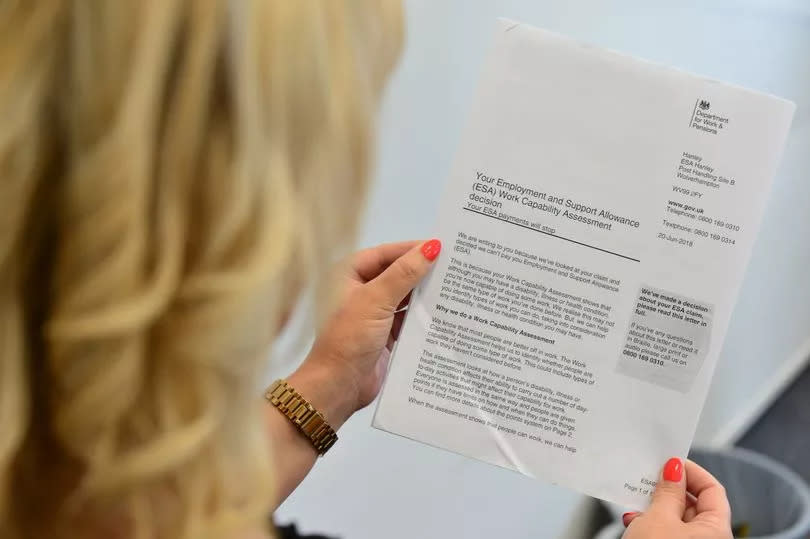DWP issues full list of dates when thousands of claimants will see benefits stop

The Department for Work and Pensions (DWP) has released a full list of dates when thousands of claimants will see their benefits come to an abrupt stop. Half a million individuals will see their payments end as they are told to claim Universal Credit instead.
Those on HMRC tax credits and three types of DWP payment will be sent letters telling them to apply for Universal Credit as their existing benefits are terminated.
During the 2024/2025 financial year, letters will be dispatched to thousands of people on legacy benefits. The DWP states that those who go on to Universal Credit are more likely to find employment within six months of their new claim rather than remaining economically inactive.
READ MORE:
Exact dates when every Universal Credit claimant will get April payment increase
DWP warning over new Universal Credit work rules as claimants told to earn more
Approximately 500,000 individuals will need to transition to Universal Credit. This comes ahead of a £2.5 billion Back to Work Plan designed to help over a million people with disabilities and long-term health conditions to secure employment rather than staying on incapacity payments where they are written off from work indefinitely. You can find out more about the latest DWP news including Universal Credit payments and changes in our Money Saving Newsletter.
This year's expansion will affect individuals claiming the following benefits starting from the months listed:
April: People claiming Income Support and those claiming Tax Credits with Housing Benefit.
June: People claiming Housing Benefit only.
July: People claiming Income-related Employment and Support Allowance (ESA) with Child Tax Credit.
August: People claiming Tax Credits (pension-aged claimants including mixed-aged couples).
September: People claiming Income-based Jobseeker's Allowance.
HMRC is set to end tax credits by the close of this year, with Income Support and Jobseeker's Allowance also being phased out. However, ESA and Housing Benefit will continue to exist for longer, with those receiving ESA only or getting it alongside Housing Benefit expected to transition in 2028/2029 as part of a cost-saving strategy.
The DWP has estimated that the delay in transferring ESA claimants to Universal Credit could result in net savings of nearly £1 billion in benefit payments, known as Annually Managed Expenditure, from 2024-25 to 2027-28. This savings estimate was certified by the Office of Budget Responsibility ahead of the Autumn Statement 2022.
The DWP calculated these savings based on two main factors. Firstly, they expect to save £1.1 billion by delaying the move of claimants who would be financially better off on Universal Credit.
The DWP estimates that approximately 600,000 ESA claimants (51%) would be better off on Universal Credit, by an average of £130 per month. They also predict that the number who would benefit from Universal Credit will decrease over time.
Secondly, there are anticipated costs of £140 million associated with delaying the transfer of claimants who would be financially worse off on Universal Credit. The DWP estimates that around 500,000 ESA claimants (41%) would be worse off by an average of £217 per month before transitional protection. They also forecast that the proportion of claimants who would be disadvantaged by Universal Credit will increase over time.
The Department for Work and Pensions has moved to calm fears that claimants will not be left out of pocket when switching to Universal Credit. Those whose Universal Credit payments would be lower than their previous benefits will receive a transitional protection top-up to ensure they're on the same amount as before.
Letters, referred to as Migration Notices, will soon be landing on doorsteps, instructing benefit recipients to switch to Universal Credit. Failure to comply within a three-month window will result in the termination of current benefits, though a one-month extension can be given to late applicants.
A dedicated helpline has been set up for individuals receiving Migration Notices. Additional assistance is available from local jobcentres and through the Citizens Advice Help to Claim service.
Employment Minister Jo Churchill said: "Universal Credit is a proven benefits system fit for the modern age. With even more people moving to Universal Credit, we can continue to provide the best level of support for people to secure financial independence through work. I would encourage all those who receive their Migration Notices to take action to ensure they continue to receive the benefits they are entitled to."
Get breaking news on BirminghamLive WhatsApp . Join our dedicated community to get the latest updates.

 Yahoo News
Yahoo News 
